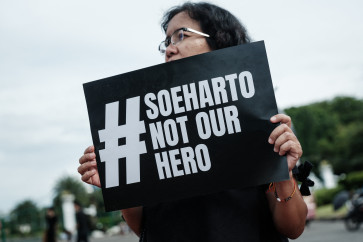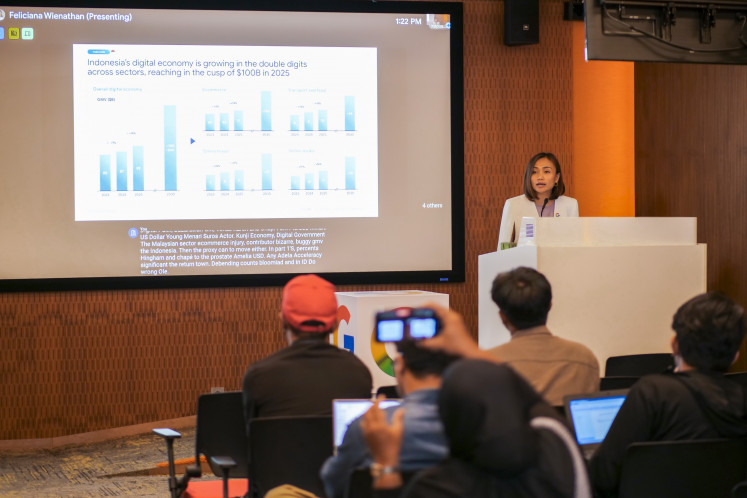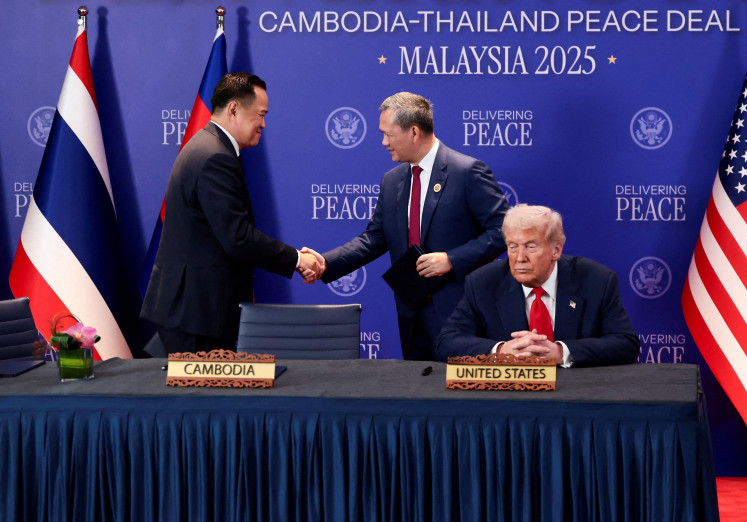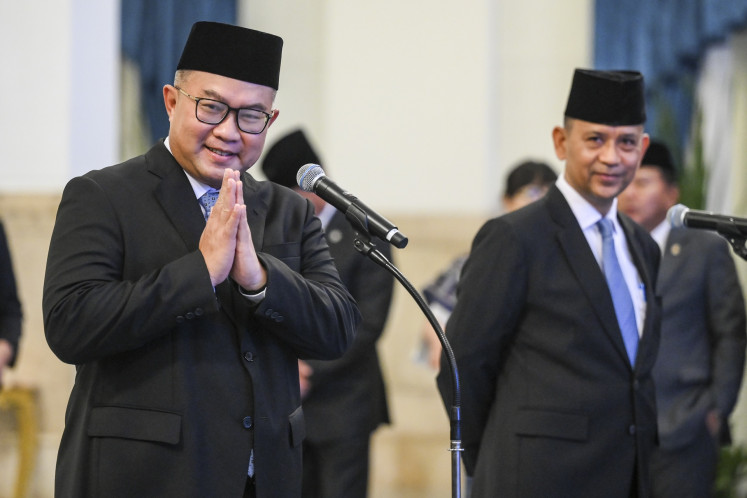Popular Reads
Top Results
Can't find what you're looking for?
View all search resultsPopular Reads
Top Results
Can't find what you're looking for?
View all search resultsDelivering the promise of the ‘Green Economy’
From June 20 to 22, more than one hundred of the world’s leaders gathered in Rio de Janeiro to discuss the future of the earth
Change text size
Gift Premium Articles
to Anyone
F
rom June 20 to 22, more than one hundred of the world’s leaders gathered in Rio de Janeiro to discuss the future of the earth. The summit adopted an outcome agreement called “The Future We Want”, which primarily encourages the countries to implement a Green Economy within their overall economic policies. Many policy makers – albeit not all – see the Green Economy as an answer for future development, given the fact that economic growth in Asia, South America and Africa has had a deteriorating impact on the environment.
Even prior to the Rio+20 summit, President Susilo Bambang Yudhoyono had given a statement that called on the world’s leaders to adopt the Green Economy as a new paradigm in development, which should be adopted immediately. His call won plaudits from many developed countries (The Jakarta Post, May 22).
In general, the Green Economy is an economic development concept that focuses on efforts to improve the quality of human life and simultaneously reduce harmful environmental impacts.
At a policy level, the Green Economy is an economic model that relies on three pillars of economic activity: Low carbon, natural resource efficiency, and socially inclusion.
Despite the excitement for this newly proposed concept, the Green Economy has been heavily criticized by a number of communities. Many groups, especially civil society entities, view the Green Economy with suspicion as they believe there is a hidden agenda behind the widespread endorsement by developed countries.
There are at least two main criticisms aimed at the concept. First, the Green Economy is seen merely as a wolf in sheep’s clothing, allowing capitalists to exploit Mother Earth. This criticism shows a strong bias toward the private sector, especially corporations that are seen as the main actors in implementing the concept. Second, it is criticized for the use of market instruments through the commoditization of nature in combating global warming as described via the REDD (Reducing Emissions from Deforestation and Forest Degradation) program, which are not entirely correct.
To be fair, these criticisms are, of course, acceptable. However, we need to bring about a more comprehensive understanding about the concept of the Green Economy. Indeed, within the Green Economy, corporations are expected to play a greater role in combating environmental degradation, though at the same time some of them are major exploiters of the environment. Giving the private sector a less meaningful role would not create a better situation, either.
The most important issue in the concept is that corporations must be held accountable for their activities relating to the environment.
In other words, they must undertake business models that favor and actively support environmental conservation.
Moreover, the so-called commoditization of nature in protecting the environment is basically the implementation of a common but differentiated responsibility principle, which was one of the main points in the 1992 Rio Declaration.
On the one hand, it may seem as though developed countries are obliged to provide financial contributions with the aim of protecting emerging countries’ forests. On the other hand, for those emerging countries, such efforts may be perceived as a mechanism that provides a fair instrument and advantages to encourage and assist in capacity building to maintain long-term conservation activities.
Hence, the question we need to address is, “How should we implement the Green Economy so that it delivers what it promises?” It seems to me that the concept on its own will not meet the need for future sustainability unless we agree to overcome several challenges.
The first is the commitment challenge. The success of the Green Economy relies heavily on the joint commitment by developed countries to deliver the financial contributions in order to provide continued support to developing countries over the long term.
In order to successfully implement green technology in our everyday business practices, we need to create the possible utilization of low carbon and resource efficiency; indeed, these are of critical importance. If the commitment to transfer green technology to developing countries is not in fact undertaken, then the Green Economy concept will become nothing more than nice-sounding words.
The second challenge is the institutional challenge. Just as with any other development model, this is a concept that is highly dependent on the role of the governments that have to create and maintain a regulatory framework and policies to produce value creations based on implementation programs.
However, there are certain points to note. On the one hand, as long as corruption remains rampant and greedy corporations are able to easily do deals with the government, the Green Economy might turn into what many environmental activists argue would be merely a new tool for capitalists to exploit the earth.
On the other hand, to ensure corporations take a larger and more active role in implementing the concept, the government should provide and support policies that can help businesses create sustainable development in the country.
It is expected that the government should be prepared to create policies that provide incentives to businesses to improve their best methods, including innovative technologies to achieve sustainable development.
The third is the challenge of selecting priorities. It is argued that this concept does not provide a clear solution for structural problems which, in Indonesia’s case, is endemic poverty. The reason is quite simple: the government has so far prioritized the implementation of this concept in the forestry sector rather than farming and agriculture. Indeed, this is currently the most feasible sector for the government to implement such a concept.
We argue, however, that in selecting priorities, consideration must be made about improving the livelihoods of the majority of impoverished people in the country.
For this to happen, creating sustainable agricultural development must be the top priority as it is the sector that contains the majority of the nation’s poor.
Investing more in agricultural infrastructure, such as dams, irrigation systems and land expansion, should be given top priority in the coming years. It is hoped that by adopting such a priority, the concept will also significantly contribute toward poverty alleviation, which is the most important problem to be solved in this country.
The key action to solving environmental problems depends on how quickly and decisively policies are implemented. Currently, we already have the right understanding of the concept to provide us with a clear road map for moving toward such action.
Ultimately, the Green Economy is just “a decision-making framework to foster an integrated consideration for sustainable development programs”. Eventually, it will be the implementation that we will need to watch closely.
The writer is a chairman of the World Wildlife Fund (WWF) Indonesia










